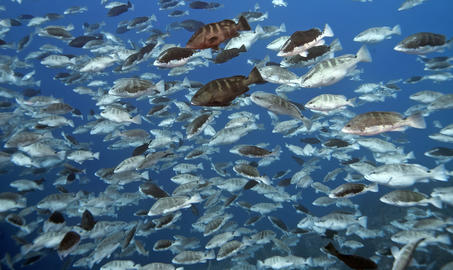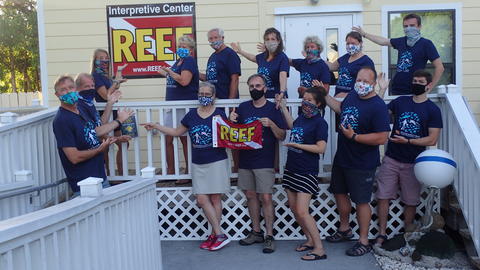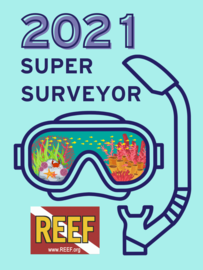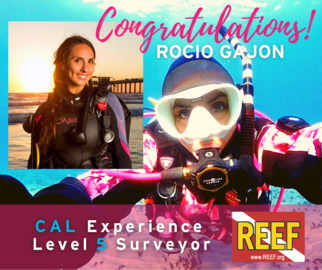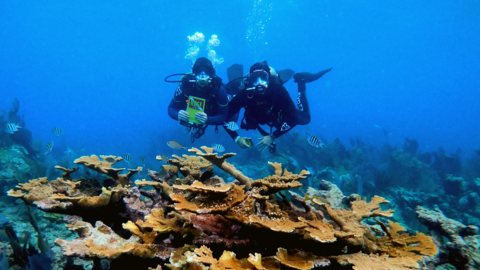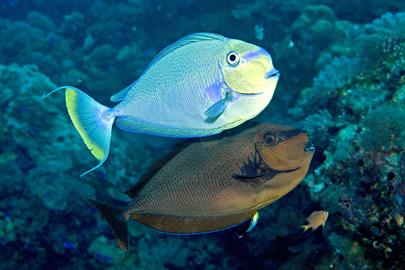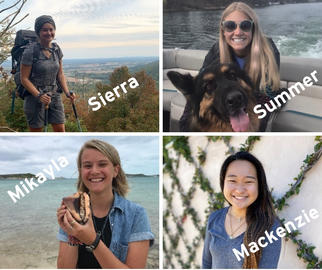Each winter since 2002, REEF has sent a team of researchers and volunteers to Little Cayman for the Grouper Moon Project. This collaborative research effort between REEF and the Cayman Islands Department of the Environment (CIDOE) conducts groundbreaking research to study the Nassau Grouper spawning aggregations, to help ensure recovery of the populations of this iconic and Critically Endangered species.
Fish usually need to be caught to be measured, but scientists from the Grouper Moon Project and Cayman Islands government have used video camera systems to collect an impressive 17-year dataset of Nassau Grouper lengths from Little Cayman. We combined this with information on growth and abundance to produce a comprehensive assessment of Nassau Grouper on Little Cayman. We found that Nassau Grouper recovered on Little Cayman largely thanks to one strong year class from 2011 spawning, 4-8x average.
Many have wondered REEF's Volunteer Fish Survey Project (VFSP) fared during a year when the COVID-19 pandemic made it challenging for many REEF volunteers to get in the water. We are pleased to share some good news from 2020:
- On April 1, 2020, the VFSP database surpased a quarter-million surveys. This is a significant milestone, not only for REEF and our worldwide community of ocean stewards, but for citizen science and marine conservation as a whole!
This year, as part of the Volunteer Fish Survey Project, join in the Super Surveyor Challenge! Everyone who conducts and submits 25 surveys during the calendar year will receive a limited-edition decal and be entered into the grand prize drawing at the end of the year.
Here's how to complete the Super Surveyor Challenge:
REEF is proud to highlight one of our outstanding Conservation Partners: Amoray Dive Center in Key Largo. REEF Conservation Partners are active organizations and dive shops committed to protecting marine environments worldwide. As valued REEF ambassadors, they serve as centers for marine conservation actions, outreach, and education. You can view the full listing of Conservation Partners or register your organization as a REEF Conservation Partner here.
Introducing our first Fish of the Month for 2021, the Bignose Unicornfish (Naso vlamingii)!
We are very pleased to welcome our Spring 2021 Marine Conservation Interns to REEF. During the spring semester, they will support the REEF team by assisting with our marine conservation programs and non-profit operations. This semester’s interns bring a unique set of skills and interests to REEF. They include:
For nearly three decades, REEF has welcomed more than 150 young adults to the REEF Campus to spend a semester immersed in marine conservation projects. This month, we highlight former Marine Conservation Intern Sarah Goldman. Read on to hear about her time at REEF and how her REEF internship helped to shape her career.
When were you a REEF intern?
Fall 2002 with fellow intern Julie Brown.
With 15,000 tube feet and up to 24 arms, the magnificent Sunflower Sea Star (Pycnopodia helianthoides) is found from Baja Mexico to Alaska. Since 2013, this magnificent species has suffered a dramatic decline due to a wasting disease. Many fear that the species may be on the brink of extinction.

